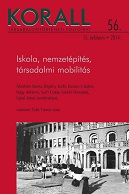Lépcsőfok vagy zsákutca? A tanítói professzionalizáció kezdetei: az abaúji reformátusok példája
Step Forward or Dead End? The Beginning of Professionalization of School Teachers through the Example of the Protestant Teachers in Abaúj
Author(s): János UgraiSubject(s): History
Published by: KORALL Társadalomtörténeti Egyesület
Summary/Abstract: The question in the title refers to the possible interpretation of ecclesiastical career choices around the beginning of the nineteenth century. The study, based on the initial compilation of all the names of relevant school teachers, discusses the lives, as well as academic and professional careers of Protestant school teachers in Abaúj in the northeast of Hungary. For the majority of the recorded 470 school teachers, teaching was a transitory phase in their careers and they worked as teachers but for a few years of their lives. On one hand, however, a group of 81 teachers is highly relevant for the study: they worked as teachers as part of preparations for their ordination as clergymen. Their studies were often rather hit and miss, and their academic progress also suggests that most cases consecrated priests did not graduate from the best schools. In their case, despite employment difficulties, working as a school teacher was a step forward. Since this step forward was made possible in a limited number of primary schools of barely over a dozen settlements, the new teachers’ fate was sealed in the moment they were told which school they were appointed to. These were all schools who had not abandoned the practice of quick turnover of teachers. As the number of these schools had decreased, people opted to become priests at an increasingly young age. To use the terminology of modern education theory: selection took place earlier and consequently it also became stricter. In this context, while that certain step forward was becoming more difficult to attain, those who managed to reach it had better chances to achieve even more. On the other hand, there is another important group of about 70 individuals who provided a stable core for the contemporary teaching community. These teachers devoted their entire career to education somewhere in the parish. Their long-term teaching positions cannot confidently be viewed as a dead end or the stagnation of career in comparison with the previous group. This is corroborated by ample evidence for cases when a congregation grew attached to their teacher as much as, or even more than their pastor, which is a decidedly significant factor in the first stages of the professionalization process.
Journal: Korall - Társadalomtörténeti folyóirat
- Issue Year: 2014
- Issue No: 56
- Page Range: 27-45
- Page Count: 19
- Language: Hungarian

